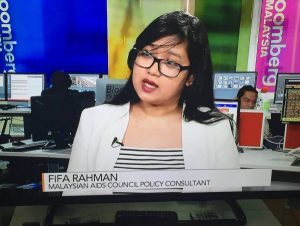This article draws on the significant amounts of rejection, threats of violence, and stigmatisation faced by LGBT Muslims, with a focus on implications for public health and the economy
By Fifa Rahman*
Postgraduate Researcher (PhD) at University of Leeds, UK
Caning of LGBT Persons
Implications for Public Health and the Economy
In the placental excreta of the recent Malaysian elections and a new government built on promises of justice and good governance, there has been increasing hatred and corresponding human rights violations towards LGBT (Lesbian, Gay, Bisexual, Transgender) people, perhaps as an overreaction to the perception that human rights would destroy religious privileges. This began with the removal of portraits of notable Malaysian LGBT activists from an art gallery in the island state of Penang, to viral tweets from extremists quoting hadith allowing for the murder of LGBT persons, and this past week has culminated in the caning of two young Muslim women for ‘attempting lesbian sex’. A gay friend of mine sent me a message on Facebook saying that his parents were part of the 100 people who witnessed the caning. Malaysian twitterverse is rife with thousands of tweets from average people saying that the caning was ‘gentle’, that there was no humiliation, and that it was a victory for Islam.
But is it really?
A victory for any group of persons should be seen in the light of economic stability, an improvement in public health, and an improvement in happiness. The public health implications first. Recent literature details how LGBT Muslims face significant strain and anxiety in reconciling their faith with their sexuality – some individuals feel aberrant, that their sexuality taints Islam, and that their sexuality is a test from Allah (Eidhamar 2014; Siraj 2012). In an analysis of British Muslim gay men, Jaspal and Cinnirella (2010: 855) write, “The dilemma lies in individuals’ perception that being gay is in some way ‘wrong’ or illicit, but that, on the other hand, it is God who has created them ‘this way’.” One scholar has suggested that in order to remedy this conflict, LGBT Muslims should resort to an alternative pedagogy of Islam (Shah 2016). Alternative interpretations aside, the fact remains that LGBT Muslims, in addition to internal conflicts of reconciling their faith with their sexuality, face significant amounts of rejection, threats of violence, and stigmatisation that negatively affects mental health.
LGBT people with mental health conditions are also notoriously difficult to reach. As Lucksted (2004: 27) writes, “LGBT people with serious mental illnesses are difficult to reach and to measure, given the multiple stigmas of psychiatric labels, LGBT identities, and the poverty common in the lives of people receiving services in the public system.” These compound existing difficulties faced by mental health staff in tackling an increasing public health burden.
LGBT Muslims are politicians, corporate executives, nurses, lawyers, waitresses, and soldiers.
When workers struggle with a lack of acceptance, anxiety, and depression, this in turn affects the economy. In a review in the United Kingdom, mental health issues in the workplace cost the UK economy £34.9bn in 2017. A study from Canada estimated that total economic costs associated with mental illness would increase six-fold over the next 30 years, exceeding $2.8 trillion (Doran and Kinchin 2017).
There is no doubt that a fervent conservative would respond to this article with ‘just don’t be gay’, and thus no mental health issues and no economic impact. But they forget the decades of cruelty of failed conversion therapies in other nations. Truly, to quote a line attributed to an array of authors, “Those who cannot remember the past are condemned to repeat it.” Homophobia and transphobia is an urgent human rights and public health issue – diplomatic measures must be deployed with greatest urgency to mitigate the burden.
*About the Author
Fifa Rahman LLB (Hons) MHL (Health Law) (Sydney) is a PhD Candidate in Law at the University of Leeds. She also represents NGOs on the Board of Unitaid, working on access to innovative health technologies in HIV, tuberculosis, and malaria.
